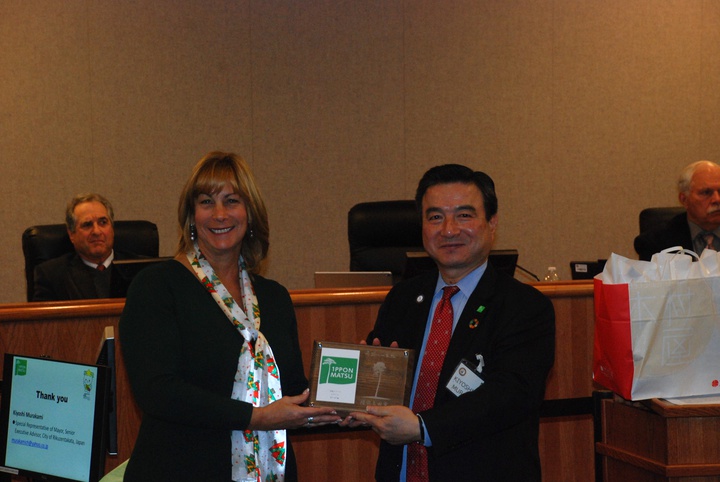Jessica Cejnar / Tuesday, Dec. 10, 2019 @ 4:29 p.m. / Community, Local Government
"We Have Strong Hope For The Future": Rikuzentakata Official Addresses County Supervisors

Kiyoshi Murakami, senior executive administrator for Rikuzentakata, presents a gift to Del Norte County Board of Supervisors Chairwoman Lori Cowan on Tuesday. Photo: Jessica Cejnar
Nearly 200 families are still in temporary housing roughly nine years after a tsunami devastated Rikuzentakata.
But the senior executive advisor of the coastal city in the Iwate Prefecture in Japan, told Del Norte County Supervisors on Tuesday community leaders have urged people with special needs to help rebuild Rikuzentakata to be more resilient and inclusive.
“No one is left behind,” Kiyoshi Murakami told Del Norte County Supervisors. “We’re working (with) a number of people with special needs who also study and work for the future. We build back for the future, inclusive communities.”
Murakami arrived in Crescent City on Sunday as part of a delegation of 35 people from Del Norte County’s sister city. During his presentation on Tuesday, among pictures and video of the disaster was a photo of Kamome floating among debris surges swept into the ocean that day.
At more than 50 feet high, the March 2011 tsunami took the lives of more than 1,800 people and displaced 13,500 people, Murakami told supervisors. The disaster also devastated a forest of 70,000 pine trees that stood next to a beach roughly 1 million people visited annually, he said.
As Rikuzentakata began rebuilding, officials decided to elevate the entire community by nearly 30 feet, Murakami said. This includes the city’s residential areas as well as its city center. Rikuzentakata is also working on a memorial park commemorating the disaster. This will be an area that isn’t elevated, Murakami said, and includes a pine forest of 40,000 trees.
According to Murakami, Rikuzentakata’s model for wanting to include people with special needs in its rebuilding process was recognized by the United Nations in 2015. He mentioned the UN’s 17 Sustainable Development Goals, a universal call to end poverty, protect the planet and ensure all people enjoy peace and prosperity by 2030.
Rikuzentakata’s project for rebuilding was also recognized by Japan’s prime minister in July as a model project for the entire country, Murakami said.
“Of course there are a number of obstacles we face, but we are actually encouraged and promoted to be a front line project,” he said, adding that it also includes incorporating ideas from other countries. “Why also we connect everybody’s ideas to give simulation programs (on) how we evacuate, how we perfect, how we prevent casualties and save lives.”
As Rikuzentakata looks to the future, Murakami said its evolving relationship with Del Norte County and Crescent City will play a significant role.
Starting with a corresponding illustration of Kamome blanketed in barnacles sitting at the Del Norte County Sheriff’s Office after it washed ashore on South Beach in 2013, he went through a timeline of significant events in the relationship.
“I know Del Norte High School tried to send it back,” Murakami said of the 20-foot fishing vessel. “I know they contacted a number of fundraising programs and then from there, Del Norte High School and Takata High started the exchange programs and they actually (signed) a sister school agreement in February 2017.”
The sister school pact led to a sister city agreement that was ratified in April 2018 in Crescent City and in Rikuzentakata two months later.
A delegation of teachers and students from Japan visited Del Norte County in January 2019. In July, Rikuzentakata received visitors from Crescent City, business leaders bringing the first cans of Kamome Ale with them.
But, Murakami said, the joint business ventures between the two communities includes more than beer and cheese. He mentioned fisheries projects, educational exchange programs and the possibility of programs to boost tourism.
“We have strong hope for the future with both communities,” he said.
Following Murakami’s resentation, District 3 Supervisor Chris Howard said though it doesn’t get easier to watch, if the March 2011 tsunami had never happened, he wouldn’t be friends with Murakami now.
“It’s not just myself, it’s our entire community now,” Howard said. “We have lessons to learn from you and Rikuzentakata, as you’re doing this week, has lessons to learn from us.”
The delegation from Rikuzentakata will spend its final day in Del Norte County on Wednesday. Part of the delegation will be at Sutter Coast Hospital to learn about women in healthcare and take a tour of the facility. Another portion of the delegation will learn about positive behavioral interventions and support and multi-tiered systems of support at Smith River Elementary School.
Wednesday will close with a traditional Christmas dinner at the Tolowa Event Center in Smith River.
CLICK TO MANAGE